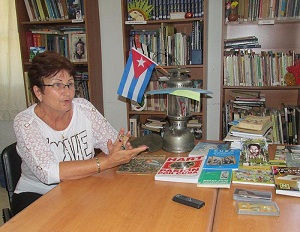 The agenda for the Association of Cuban Pedagogues (APC) for next year is likely to be a very busy one, given the significant number of both national and international events in the field, organized by members and educators from other parts of the world.
The agenda for the Association of Cuban Pedagogues (APC) for next year is likely to be a very busy one, given the significant number of both national and international events in the field, organized by members and educators from other parts of the world.
The organization is currently mid-way between its last Congress in December 2013 and the next scheduled for 2018. We spoke to Xiomara Santos Lago, APC first vice president, to learn more about activities planned for the remainder of this year and the next.
Does the APC only organize national events?
We conduct several international activities including, and for the past fifteen years, a meeting called “Investigative research among U.S. and Cuban educators.” This takes place each February in a different province and U.S. teachers participate.
From 2017, the name will change; it will be called the “Scientific Seminar between North American and Cuban educators”. It will be a seminar as they (U.S. participants) can now travel to Cuba and all those who are interested will be able to participate.
We also organize the Pablo Freire international event, which brings together many popular educators from Latin America. Its headquarters is the province of Cienfuegos.
Moreover, for the remainder of the year we have planned the “Teachers facing the challenges of the twenty-first century” event, for the month of October, from the 2nd–6th, which also has an international character.
We also have the “Games and Society” meeting, which began on a national basis, but next year will session internationally.
“We have a set goal: for each branch to grow by 10%, to reach 40,000 members. We are trying to incorporate new educators through different activities,” noted APC Vice President Xiomara Santos Lake. Photo: Rosaylín Avilés Guerrero
Among the national activities we organize the “Language and Literature” event, and next year we will host an international colloquium on this theme.
We also embrace several initiatives that generate national workshops and exchanges with other provinces, for example the “Transform to educate” project, which we undertake with school councils; the “With infinite love” project, undertaken with pedagogical schools; and the “United to educate” project, with middle school students and teachers.
How does the APC recognize its members?
The APC awards several prizes, the most important of which is the Pedagogy prize, awarded to those researchers whose scientific results have contributed to Cuban education.
Another award is the Novice Educator prize. This is awarded for an outstanding record in research and personal development. And candidates can be nominated up to the age of 35.
“This is very significant for young educators, as despite briefer work experience, they can be awarded this recognition. The last was awarded to a young doctor in Pedagogical Sciences from Cienfuegos, with proven theoretical – practical results in higher education and as a member of the APC.”
The Association has a history of almost 30 years…
Each stage has marked something important for the Association. The first was the organizational phase, the establishment of provincial branches and the moves made to form part of such a significant association of Cuban educators. This process went very well. Everything began in those first 15 years.
In the second stage, the growth of the association was revived. We reached over 40,000 members. There has been sustained development and we have undertaken lots of work with popular education projects and methodology.
The following period also had its peculiarities in terms of the legal and organizational aspects. Progress was made in the legal area and the training of presidents.
In this era, the scientific aspects have been worked on. The projects, guidelines, and the development of events at a provincial level. We are still not there. There have always been national initiatives and the provinces are part of these, but now these territories are developing their own projects and creating scientific sections based on their needs, in order to address them.
How do the current efforts of the APC relate to the perfecting of the Cuban education system?
There is no stated aspect in terms of this improvement, but one way or another, the results we obtain and our research provide tools.
Almost all of our projects are based on a participatory and dialogic methodology. This way we are providing educators with a means of flexibility, to make their classes more innovative. Although not a set objective, we contribute to the desired improvements in the country so that teachers can conduct their classes differently, so that, for example, History classes are innovative.
What are the main goals in the medium and long term?
To continue working for both Cuban and Latin American pedagogy, which is fundamental; to continue creating spaces for reflection, debate, educational ideas; to continue encouraging our educators. To grow and ensure all our educators are happy. To collect all the knowledge of our elders and immerse our youth in Cuban pedagogy.
(Granma)